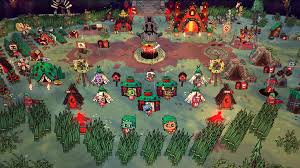You may not realize that Roguelike games are not just about their challenging difficulty and permadeath mechanics; there are key characteristics that define this genre.
From the intricate procedural generation of levels to the strategic turn-based gameplay elements, Roguelike games offer a unique experience that keeps players coming back for more.
But what truly sets them apart in the world of gaming? Let’s explore the defining features that make Roguelike games a beloved and enduring genre.
Permadeath in Roguelike Games
Permadeath in Roguelike Games adds a high-stakes element to gameplay where your character’s demise is permanent, challenging you to strategize and adapt to survive each encounter. Unlike traditional games where you can reload a saved game after dying, in Roguelike games, once your character dies, it’s game over. This feature creates a sense of tension and urgency, making every decision crucial to your survival. Each move you make must be carefully considered, as one wrong step could lead to irreversible consequences.
The permanence of death in Roguelike games forces you to learn from your mistakes and improve your skills with each playthrough. It encourages you to think critically, plan ahead, and be prepared for unexpected challenges. This challenging aspect of Roguelike games keeps you engaged and invested in each moment, as you strive to overcome the odds and emerge victorious in the face of adversity.
Procedural Generation Mechanics
In Roguelike games, one key element that significantly impacts gameplay is the use of procedural generation mechanics. These mechanics involve the random generation of game elements such as levels, maps, items, and enemy placements. Each playthrough is unique due to this randomness, providing a fresh and unpredictable experience every time you start a new game.
Procedural generation mechanics ensure that no two gameplay sessions are alike, enhancing replay value and keeping the game challenging and engaging. The randomness introduces an element of surprise, requiring you to adapt your strategies on the fly as you encounter different obstacles and opportunities with each playthrough.
Turn-Based Gameplay Elements
Turn-based gameplay elements in Roguelike games require strategic decision-making and tactical planning to navigate through challenging scenarios. In this style of gameplay, each action you take, whether moving, attacking, or using items, is typically followed by the enemy’s turn. This creates a dynamic where you must carefully consider your moves as each decision can have significant consequences on your survival.
The turn-based system in Roguelike games allows you to pause and assess the situation before committing to an action. It gives you the opportunity to plan your moves ahead, think about potential risks, and adapt to unexpected developments. This strategic aspect adds depth to the gameplay, as every choice you make can impact your progression through the game.
Moreover, turn-based gameplay encourages a thoughtful approach to encounters, forcing you to weigh the benefits and drawbacks of each decision. By incorporating this element, Roguelike games challenge you to think critically and analytically, enhancing the overall experience and rewarding careful planning.
Exploration and Dungeon Crawling
When navigating through Roguelike games, you’ll find that Exploration and Dungeon Crawling play pivotal roles in uncovering hidden treasures and facing challenging adversaries. The thrill of venturing into uncharted territories, never knowing what dangers or rewards lie ahead, is a core element of the Roguelike experience. As you delve deeper into procedurally generated dungeons, each step you take could lead you to a valuable artifact or trigger a deadly trap.
Exploration in Roguelike games isn’t just about uncovering the map but also about making strategic decisions on which paths to take, weighing the risks and rewards along the way. The unknown nature of each new dungeon layout keeps you on your toes, requiring careful planning and adaptability to survive. Dungeon Crawling, on the other hand, involves navigating through labyrinthine corridors, battling monsters, and solving puzzles to progress further.
In Roguelikes, the sense of exploration and the thrill of dungeon crawling are intertwined, creating an immersive and dynamic gameplay experience that keeps you engaged and eager to discover what lies around the next corner.
Challenging Difficulty and Replayability
Navigating through Roguelike games presents players with a formidable challenge and a high degree of replayability due to their punishing difficulty levels and procedurally generated content. Each playthrough offers a unique and unpredictable experience, keeping you on your toes and encouraging you to adapt your strategies constantly. The unforgiving nature of Roguelikes, where death often means starting over from scratch, adds an intense sense of urgency and tension to every decision you make. This constant risk of losing progress creates a thrilling atmosphere that pushes you to learn from your mistakes and improve with each run.
The challenging difficulty of Roguelikes not only tests your gaming skills but also your ability to think quickly and make strategic decisions under pressure. The combination of tough enemies, scarce resources, and permadeath mechanics forces you to carefully plan your every move and explore different tactics to survive. Despite the frustration that may come with repeated failures, the satisfaction of overcoming these obstacles and mastering the game’s mechanics is immensely rewarding. The addictive nature of Roguelikes lies in their ability to keep you coming back for more, eager to conquer their formidable challenges and unravel the mysteries of their ever-changing worlds.
Conclusion
So, now you know what makes a game a roguelike.
With its permadeath, procedural generation, turn-based gameplay, exploration, and challenging difficulty, roguelike games offer a unique and immersive gaming experience.
Whether you’re a seasoned player or new to the genre, these characteristics provide endless replayability and excitement.
So, next time you’re looking for a game that will test your skills and keep you on your toes, give a roguelike a try!
